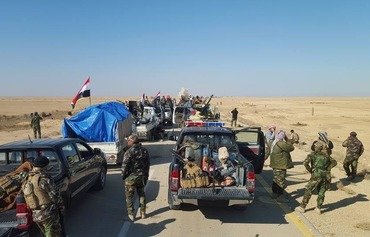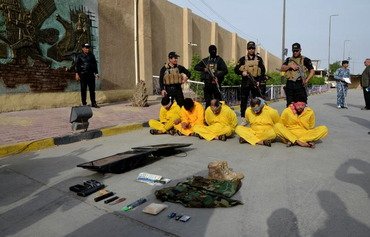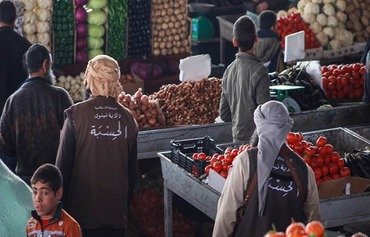A dip in "Islamic State of Iraq and the Levant" (ISIL) finances has seen the group scrambling for alternative sources of funding that include stealing the possessions of civilians and reselling them in Syria, residents and officials say.
In the westernmost Iraqi province of Anbar, ISIL elements have been confiscating real estate properties and stealing the personal belongings of residents, smuggling them across the border to sell, they said.
Al-Qaim resident Abu Hakam, 47, who asked to use a pseudonym out of fear for his safety, told Diyaruna he fled al-Qaim for the Kilo 18 refugee camp west of Ramadi in 2015, almost one year after his hometown fell to ISIL.
Newly displaced al-Qaim residents arriving at the camp told him ISIL had confiscated his house and stolen his furniture, household appliances and car.
ISIL elements consider anyone who fled from their so-called 'caliphate' as "a traitor and an apostate", he said. "They have given themselves the liberty to confiscate and plunder people’s possessions under the pretext that they are spoils of war".
"They are now trying to do everything to make money," he said.
Plundering private residences
As its losses mount, ISIL is looking for alternative resources to finance its operations and preserve its control over the far western parts of the province -- al-Qaim, Anah and Rawa, said Anbar provincial council member Naeem al-Koud.
The group is facing a severe financial shortfall as a result of its loss of control over vast areas rich in oil and other resources, he told Diyaruna, and is now relying on stealing as its primary source of revenue.
"These terrorist gangs" have started to plunder the private residences of internally displaced persons (IDPs) and of residents who refuse to co-operate with the group, he said.
"They steal cars and all light-weight valuables such as gold jewelry, as well as home appliances, agricultural, animal and commercial possessions," he said.
They take whatever they can put their hands on, smuggling the stolen goods to Syria and selling them there, he said, estimating that ISIL has amassed about $12 million from the smuggling and sale of stolen goods.
To a lesser degree, al-Koud said, the levies it imposes on all residents provide it with an additional source of revenue.
ISIL elements threaten they will confiscate people's properties if they do not pay the taxes imposed by the group, he said, adding that ISIL collects at least $100 a month in levies from each household.
Local residents have been banned from leaving the area unless they need medical attention, al-Koud said.
Even then, he said, they have to pay a hefty sum, $10,000, to be allowed to leave, with their family and possessions used as collateral to ensure their return.
Many locals cannot afford to pay that sum, he said, and have been forced to endure deplorable health and living conditions rather than seek treatment.
Escaping ISIL's tyranny
ISIL is seeking to take full advantage of its remaining strongholds in the province to secure funds in any way possible, said Maj. Salah Fadhil, commander of the Ameriyat al-Sumoud tribal force in Anbar.
"This includes confiscating and plundering homes whose occupants have fled, and homes of people ISIL wants to capture or kill, such as former members of the police and army," he told Diyaruna.
Over the past two months, refugee camps in the province have welcomed many displaced families from western Anbar "who left all their belongings behind to escape the tyranny of the terrorists", he said.
Anbar provincial council member Athal al-Fahdawi told Diyaruna that seizing and looting people’s homes is yet another example of the group's "criminal behaviour".
"We have come to expect this of terrorists, as they have given themselves license to do anything," he said.
However, he added, the group took over scores of homes in Mosul, "but then lost them after areas were liberated and the houses were returned to their rightful owners".
Once the battle to liberate Mosul is over, al-Fahdawi said, the focus will be on liberating the remaining parts of western Anbar and returning IDPs to their homes.

![A Mosul resident returns to his home carrying the Iraqi flag after the'Islamic State of Iraq and the Levant' was ousted from his area. [Photo courtesy of Hirasat Baghdadya Facebook page]](/cnmi_di/images/2017/03/17/7458-man-flag-mosul-600_384.jpg)






